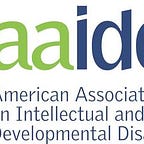Hot Release Research Corner : January 2018
Happy New Year! Please welcome AAIDD Student and Early Career Professional Interest Network’s another new project: Hot release research corner.
We would like to disseminate our AAIDD SECP member’s recent published article via the blog with the AAIDD SECP community and beyond for a larger purpose and audience.
For a kick-off, Ariel Schwartz (PhD Candidate in Rehabilitation Sciences at Boston University) shared her recent article: “I just had to be flexible and show good patience”: management of interactional approaches to enact mentoring roles by peer mentors with developmental disabilities. Please do not hesitate to comment or provide questions below!!
There is a growing interest in peer mentoring for young adults with intellectual and developmental disabilities (I/DD). However, usually the mentors are young adults without disabilities. But, mentors with I/DD may have more shared experiences that help them be better mentors than people without disabilities. In our research on peer mentoring in a multicomponent problem solving and self-advocacy curriculum, Project TEAM, we found that when provided with support, young people with I/DD are able to follow a phone-based mentoring curriculum, form social connections, and help their mentees learn a problem solving strategy (Kramer, Ryan, Moore, & Schwartz, 2017; Ryan, Kramer, & Cohn, 2016). We wanted to understand how peer mentors with I/DD perceived their role as mentors. Did they see themselves as: Friends? Teachers? Employees? Role models? Or something else? We thought it was important to understand their perceived roles, because we know that people’s perceived roles influence their behaviors, including the way they act as mentors.
We asked mentors about their experiences as peer mentors. Each mentor told us about their experiences with their different mentees. Then, we used qualitative data analysis methods to learn about their perceived roles and how they enact these roles.
We found that mentors perceived themselves as professionals; they talked about peer mentoring as a “job” and discussed the importance of “work ethic.” They felt that their primary professional responsibility was teaching, or being a teacher. Some mentors, also felt that part of their professional role was developing interpersonal relationships, or friendships, with their mentees.
Mentors described many actions that supported their teaching role, such as using “prompt” questions, “breaking down” concepts, and sharing examples and personal experiences. They talked less about actions to support their friend role; the primary action related to this role was asking about their mentees’ interests. Some actions supported both roles, such as providing encouragement and positive feedback.
Many mentors talked about the importance of their disposition, or their specific attitudes and temperaments. They thought it was really important to be positive, flexible, and patient, and that this was part of being a professional.
To make sure that their mentees were engaged with and understanding the problem-solving strategy, the mentors had to monitor mentees’ responses to questions. They talked about adjusting the way they taught or talked to their mentees depending on their engagement and understanding. For example, one mentor talked about redirecting her mentee when she wasn’t paying attention. She shared, “I would tell her that we are not talking about SpongeBob. We are talking about [the problem-solving process].” Mentors also created “quizzes” and “challenges” to check their mentees’ understanding.
All of this was a lot of work and mentoring was sometimes frustrating. There were times when the mentees interrupted the mentors, were off topic, or were not engaged. In response, mentors told us they had to keep their professional dispositions. One mentor shared, “I just had to be flexible and show good patience. But I made sure to stay as being positive.” Another mentor told us that he was frustrated when one mentee wanted to talk about unrelated topics: “all [my mentee] wants to do is talk…I’m trying to get…really positive…I’m trying really hard and saying, [mentee]…I know you want to keep the conversation going, but…I gotta stick with it…I don’t want to get side tracked…I’m always thinking positive.”
Mentors also had to use self-regulation when their natural approach was not a good fit for their mentees. For example, one mentor said, “If I talked too much, [my mentee] would shut down,” and another said, “I should go slow, cause that’s what pace he has. I don’t want the way I’m doing nowadays [going fast], ’cause that makes [mentee] feel uncomfortable.” In these situations, mentors had to self-regulate and change their approach.
The mentors had a lot of supports. They had a script, a tip sheet, supervision, and received training. Some mentors spoke to their supervisor once a week to check-in and troubleshoot, but other mentors liked having their supervisor sit next to them while they made their mentoring phone calls. Mentors told us that these supports helped them manage their roles and self-regulate.
We noticed that most mentors focused on their teaching role. They also described more specific actions and dispositions related to this role. This might have been because the time period was too short to develop strong relationships; most mentoring research suggests at least one year is necessary to form a strong bond. Mentors may have been focused on their teaching role because they were excited about and valued their professional role and felt teaching was more aligned with professionalism.
This research showed us that we need to do more research about peer mentors with I/DD. We have evidence that they can be good mentors and teach their mentees. However, they may need more explicit training in developing interpersonal relationships with their mentees.
You can find the full article:
For more about peer mentoring in Project TEAM:
Ariel Schwartz, MS, OTR/L is a PhD Candidate in Rehabilitation Sciences at Boston University. Her primary interest is in supporting young adults with I/DD to engage in participatory research. She is currently involved in a participatory research process to develop and study a new youth self-report of everyday functional tasks, the Pediatric Evaluation of Disability Inventory-Patient Reported Outcome (PEDI-PRO).
